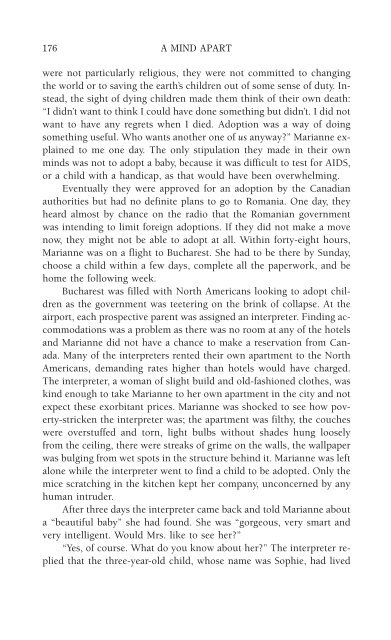978-1572305441
autism
autism
You also want an ePaper? Increase the reach of your titles
YUMPU automatically turns print PDFs into web optimized ePapers that Google loves.
176 A MIND APART<br />
were not particularly religious, they were not committed to changing<br />
the world or to saving the earth’s children out of some sense of duty. Instead,<br />
the sight of dying children made them think of their own death:<br />
“I didn’t want to think I could have done something but didn’t. I did not<br />
want to have any regrets when I died. Adoption was a way of doing<br />
something useful. Who wants another one of us anyway?” Marianne explained<br />
to me one day. The only stipulation they made in their own<br />
minds was not to adopt a baby, because it was difficult to test for AIDS,<br />
or a child with a handicap, as that would have been overwhelming.<br />
Eventually they were approved for an adoption by the Canadian<br />
authorities but had no definite plans to go to Romania. One day, they<br />
heard almost by chance on the radio that the Romanian government<br />
was intending to limit foreign adoptions. If they did not make a move<br />
now, they might not be able to adopt at all. Within forty-eight hours,<br />
Marianne was on a flight to Bucharest. She had to be there by Sunday,<br />
choose a child within a few days, complete all the paperwork, and be<br />
home the following week.<br />
Bucharest was filled with North Americans looking to adopt children<br />
as the government was teetering on the brink of collapse. At the<br />
airport, each prospective parent was assigned an interpreter. Finding accommodations<br />
was a problem as there was no room at any of the hotels<br />
and Marianne did not have a chance to make a reservation from Canada.<br />
Many of the interpreters rented their own apartment to the North<br />
Americans, demanding rates higher than hotels would have charged.<br />
The interpreter, a woman of slight build and old-fashioned clothes, was<br />
kind enough to take Marianne to her own apartment in the city and not<br />
expect these exorbitant prices. Marianne was shocked to see how poverty-stricken<br />
the interpreter was; the apartment was filthy, the couches<br />
were overstuffed and torn, light bulbs without shades hung loosely<br />
from the ceiling, there were streaks of grime on the walls, the wallpaper<br />
was bulging from wet spots in the structure behind it. Marianne was left<br />
alone while the interpreter went to find a child to be adopted. Only the<br />
mice scratching in the kitchen kept her company, unconcerned by any<br />
human intruder.<br />
After three days the interpreter came back and told Marianne about<br />
a “beautiful baby” she had found. She was “gorgeous, very smart and<br />
very intelligent. Would Mrs. like to see her?”<br />
“Yes, of course. What do you know about her?” The interpreter replied<br />
that the three-year-old child, whose name was Sophie, had lived



